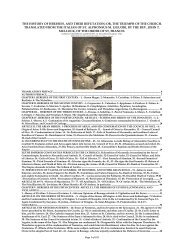The Writings of St. Francis of Assisi - + Saints' Works
The Writings of St. Francis of Assisi - + Saints' Works
The Writings of St. Francis of Assisi - + Saints' Works
Create successful ePaper yourself
Turn your PDF publications into a flip-book with our unique Google optimized e-Paper software.
Fragments <strong>of</strong> other rules<br />
[Frag]<br />
THE WRITINGS OF ST. FRANCIS OF ASSISI<br />
APPENDIX<br />
<strong>The</strong> student <strong>of</strong> the Rule <strong>of</strong> <strong>St</strong>. <strong>Francis</strong> will find it useful to compare these fragments with the text <strong>of</strong> the<br />
Regula non-Bullata. Mostly <strong>of</strong> scholarly interest, they serve to shed some light, however obscure, on the<br />
development <strong>of</strong> <strong>St</strong>. <strong>Francis</strong>' expression <strong>of</strong> what was essential to <strong>Francis</strong>can life. One group <strong>of</strong> fragments<br />
have been salvaged from the Codex <strong>of</strong> Worcester (fol 158v-159v) and another from the writings <strong>of</strong> Hugo<br />
<strong>of</strong> Digne, in his Exposition <strong>of</strong> the Rule, written between 1245-1255 A.D., and still another from Bl. Thomas<br />
<strong>of</strong> Celano's Vita Secunda, written in the winter <strong>of</strong> 1226-7.A.D..<br />
I. From the Codex <strong>of</strong> Worcester 513<br />
1-5 [XXII,1-7] [Let us attend, all friars that the Lord says: Love (dilectio) your enemies<br />
and do good to those who hate you (cf. Mt 5:44 par.), because Our Lord Jesus Christ, whose<br />
footsteps we must follow (cf. 1 Pt 2:21), called His own betrayer friend and <strong>of</strong>fered Himself<br />
willingly to His own crucifiers. · <strong>The</strong>refore all those are our friends "who unjustly bring upon us"<br />
tribulations, difficulties,] embarrassments, 514 injuries and sorrows and torments, martyrdom and<br />
death; (these are the ones) whom we ought to love much, because from this, which they bring<br />
upon us, we have eternal life. · And let us castigate our body, crucifying it together with (its)<br />
vices and concupiscence and sins, because by living carnally it wants 515 to bear away from us the<br />
love (amor) <strong>of</strong> Jesus Christ and eternal life and to send its very self with the soul into Hell; ·<br />
because we through our own fault were stinking, contrary to the good, prompt and willing to<br />
evil; · because as the Lord says: "From the heart proceed and come forth wicked thoughts" (Mk<br />
7:21) etc..<br />
6-8 [XXII,9-12,17] ...but however, after we have dismissed the world, we have nothing<br />
else to do, except to be solicitous to follow His will and please Him; · let us beware much, lest<br />
we be as the rocky and thorny ground situated along the road, according to that which the Lord<br />
says in the Gospel: "<strong>The</strong> seed is the word <strong>of</strong> God" (Lk 8:11); "which fell along the road, and was<br />
trampled upon" (cf. Lk 8:5) and etc. through to: · "they bear fruit in patience" (Lk 8:15).<br />
9-13 [XXII,18-24] And on that account, all friars, as the Lord says: "Let us dismiss the<br />
dead ... their (dead)" (cf. Mt 8:22); · and let us beware much <strong>of</strong> the wickedness and subtlety <strong>of</strong><br />
Satan, who wants, that a man not have his virtue and his heart (turned) toward the Lord; · and<br />
going around, he desires to bear <strong>of</strong>f the heart <strong>of</strong> a man under the appearance <strong>of</strong> some wage or<br />
help and to suffocate the word and precepts <strong>of</strong> the Lord from (his) memory and wanting to<br />
inhabit and blind the heart <strong>of</strong> a man through secular business and cares, · as the Lord says:<br />
513 To facilitate reference, each paragraph is identified, in italics, with the corresponding versenumber<br />
<strong>of</strong> the Latin text (as it appears in K. Esser, pp. 361-6) and comparable verse location in<br />
the Regula non-Bullata [RegNB]. For other notes, refer to these corresponding sections in that<br />
Rule. This first section <strong>of</strong> the Fragments comprises part I.<br />
514 lit. verecundias, things that make us ashamed.<br />
515 <strong>St</strong>. <strong>Francis</strong> speaks metaphorically here, for the body, by the effects <strong>of</strong> original sin, is inclined<br />
to inordinate desires.<br />
Page - 111













